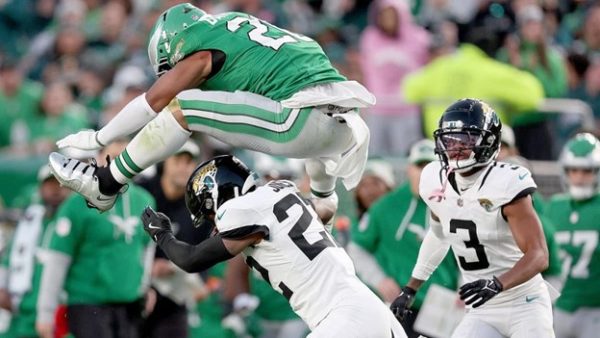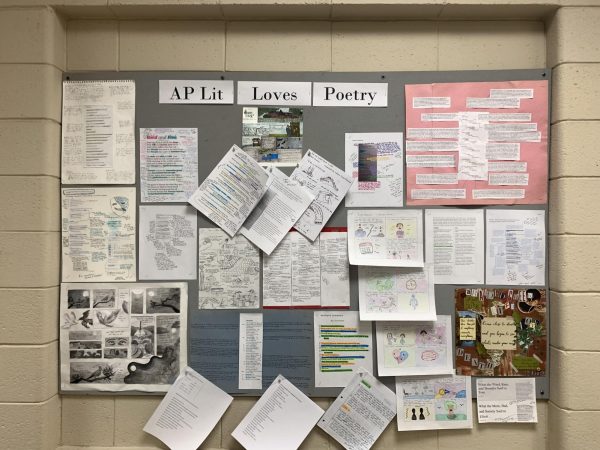Rick Sierzega: The Titan Trainer
The clock is ticking, the scoreboard is tied, and intensities are at an all-time high. Two teams face off against one another when suddenly, caught up in the moment, caught up in the action, a player has fallen. The whistle is blown; the stadium grows quiet as the athletes on the field take a knee. To Central Bucks High School South athletic trainer Rick Sierzega, this is when the real game begins.
Sierzega has been an athletic trainer for the past three years. He attended an undergraduate program at Towson University in an accredited program to become certified by the national board. His job at South is to care for and work with each sports team, every season, to not only heal injuries but to also prevent them from happening.
On an average day, Sierzega arrives at CB South around 1:30 pm. As he enters his office, he prepares for the onset of student injuries he might face. To Sierzega, this involves gathering tools such as “bandages, tape, and ice from left and right.” Once the 2:30 bell rings, this is his cue; the school day is over, and the students are on their way to visit him before their practices or games.
Sierzega’s role during a practice is to “be available for assistance in treating and monitoring new or recovering injuries.”
While at a home game, Sierzega can be found moving from game to game taking place at CB South with his equipment at hand; he doesn’t go to away games often because it is usually the home team who provides the assistance of an athletic trainer.
“During a game you can find me near the sideline or bench, keeping my head on a constant swivel, in order to watch the play and what is going on around it, looking for awkward falls or anything of that matter which could lead towards injury,” he said.
The most common injuries seen in high school sports, he said, include “ankle sprains, problems with the knee, and the biggest being concussions.” What student athletes often don’t realize about the injuries they receive during their games or practices is “the severity of some injuries especially in case of a concussion. Athletes don’t think going back in the game will cause an impact but if an injury is sustained, they can hurt their longer-term health,” said Sierzega. He said that the sports associated with the most injuries are “football, lacrosse, [and] hockey because they are high contact.”
With Sierzega’s guidance, student athletes have a better knowledge of the consequences that can come with ignoring even the most subtle of injuries. They can gain a better understanding of how this is detrimental to their health and athletic aspirations.
Despite having the opportunity to work with local future athletes, the role of an athletic trainer is not always fun and games. Sierzega explained the frustrations that come with helping young athletes. “I find the most difficulty when the extent of an injury is not taken seriously or rehabilitation rules aren’t followed.”
When speaking about the healing period, Sierzega noted that “six to eight days is a critical monitoring period; from there a course of action can be decided.” This waiting game can often be hard on the students he works with. His advice: “Listen to your coaches and trainers; we only have your best interest and aren’t trying to be a hassle. Be aware as an athletic trainer we aren’t pulling you out of a game for no reason; we want to help you get back on the court or field as fast as possible, as safe as possible.”
One quality that allows Sierzega to work well with and understand the perspective of student athletes is his own athletic history. When he was younger, Sierzega was involved in sports, such as baseball and basketball. This has helped him relate to his patients because he can “emphasize the importance of stretching and how to be patient, giving any injury the attention it needs before going back to a student’s sport of choice.”
Students never have to worry about their injuries being an issue of privacy as Sierzega, along with other figures in the medical field, follows a code of ethics. This means any issues discussed or any treatment provided is not a matter of sharing; the health of CB South student athletes is confidential and does not leave Sierzega’s room.
Although he cannot share the specific condition of any of his students, Sierzega is able to discuss his favorite memory throughout his years as an athletic trainer. “I love working with teams who are just as passionate about sports as I am, playing at a competitive level.,” he said. “This past fall I was able to work with the girls’ soccer team in their districts run. It is always nice to see the program you are working with reach the success you know they are capable of.”
While at times being an athletic trainer for high school sports teams can be a difficult task, Sierzega proves working your hardest and having the ability to relate to your patients makes the job rewarding.
Thanks to the athletic trainer on the scene the game is not over quite yet. Sierzega helps the fallen field player stand up. As he walks off the crowd erupts in applause. The whistle is blown, play on.



